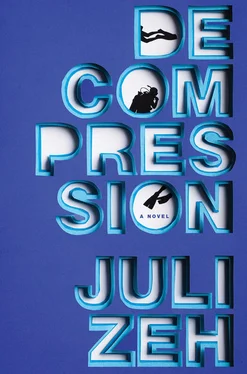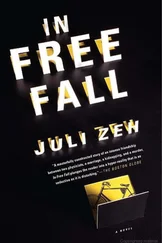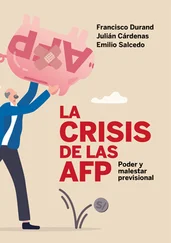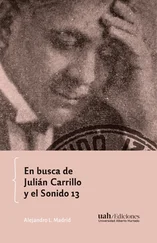I made my way up the anchor cable hand over hand, a little faster at the start because the cable sagged in the current, and then more slowly so as not to surpass the proper ascent speed. My first stop came at seventy-five meters, where I changed gases and then waited a further two minutes without taking my eyes off the dive computer. Constantly monitoring the parameters required my complete concentration. At three minutes per meter, up to a depth of forty-five meters; there a five-minute pause, including another gas change. Then continuing upward with increasingly longer decompression stops to twenty-one meters, where I had to wait twenty minutes and noticed for the first time the increase in the current. My arms and hands were already aching from clinging so tightly to the anchor cable. As soon as I noticed those aches, I started thinking I couldn’t hold on one second longer. Using one hand, I fished the mooring rope out of my pocket and attached myself to the cable. The next hour and a half was taken up with the coordination of ascent and stops, and I had no opportunity for reflection. For the first time, I looked up. The Aberdeen’s oval hull lay obliquely above me. It was a reassuring sight. Some part of me must have secretly reckoned with the possibility that my support ship might disappear. It was hard to imagine that Jola was actually up there. My desire to see her and report on my meeting with the Fiedler was like a pang in my belly. At the same time, I already felt disappointment at never really being able to describe to her what I’d experienced, because there were no suitable words for it. The eternally dusky undersea world, the sleeping ghost ship, the pitiless dimensions of past, ocean, and death — that was all trapped inside my head. No one but me had seen those sights. I’d have to work hard with Jola to help her develop the abilities necessary for diving down there with me someday. Maybe she could do it in a year or two. Then we’d share the same memory forever. The Fiedler would marry us.
Now I was being pulled upward as powerfully as down. Below me was darkness, above me light. The boundary between all conceivable opposites ran straight through me. I hung between bright and dark, above and below, yesterday and tomorrow, life and death. My instruments told me what direction I should move in, and when: higher, immediately. I unhooked the mooring rope and worked my way up the next fifteen meters, making various stops of four to thirteen minutes.
The glass ceiling lay six meters below the surface. I had to remain at that depth for an hour, alternately breathing pure oxygen and bottom gas, while the Aberdeen ’s hull was directly above my head, so close it seemed I could touch it by stretching out a hand. Below me was the vitreous blue water mass of the Atlantic, in whose uppermost layer I found myself. There was nothing for eye or hand to fasten on except the anchor cable, which was quickly lost to sight in the deep. Now everything was pulling me upward and nothing down. I wanted out. Out where I could talk, breathe, get dry. So as not to lose my nerve, I strenuously avoided looking up.

Barely ten minutes had passed when I heard a loud splash. Something heavy must have fallen into the water. I raised my head and looked up toward the surface. A person was floating next to the boat.
Now they’re ruining everything , I thought. The careful plan, our agreement, my trust. The spirit of the expedition. Because they got bored. Or too hot. Because they decided to abandon their posts and go for a little swim while I’m finishing down here . Disappointment took my breath away for a moment. Until that moment, everything had gone well — had gone perfectly, in fact. I couldn’t believe I’d been so wrong about Jola. She begged me to go along on this expedition . She’d wanted to be my partner, a person on whom I could rely 100 percent. Or had she? My reason was exhausted, and I could see I was arriving at strange conclusions. All I knew for sure was that the little swimming party up there represented an attack on everything I held dear.
Then I realized that there weren’t two bodies swimming in the water, only one. And that one wasn’t swimming, it was sinking.
I can see him in memory, gently drifting down toward me. In reality, he must have dropped like a stone. Nevertheless, I had endless time to reflect, or so it seems to me today. Jola , I thought. Something’s happened to her . To be more precise, what I thought was: Now it’s happened . As though it had always been a given that something would, to her.
Against the light, the body showed like a dark spot that grew larger as it came nearer. Its contours billowed in the agitated water. This person has to return to the surface at once , I thought. I’d already let go of the anchor cable and would have simply swum up if the rope hadn’t held me back. My reason seized the opportunity to yell my instinct down: You’re staying where you are!
If I surfaced now, the nitrogen inside me could expand fatally. Or make me very sick: vomiting, breathing difficulty, paralysis of arms and legs. I might pass out with blood running from my ears. Moreover, I didn’t know what had happened on the Aberdeen . Jola wasn’t making any swimming movements. Had she hit her head and fallen overboard? But then why wasn’t Theo making any attempt to rescue her? Was he asleep in a fog of alcohol fumes? I thought it was something else. I thought Jola and Theo must have had another quarrel. He’d knocked her down and thrown her into the water. Or she’d been injured in the struggle and fallen over the rail. In any case, it was clear, as the seconds went by, that Theo was purposely letting her drown. If I broke the surface with the unconscious Jola, I ran the risk of his attacking us both in the heat of the moment. Or he might simply start the boat and chug away. Even if he didn’t become aggressive, I still couldn’t assume he’d do whatever it would take to get me to the nearest decompression chamber. And not even considering the question of whether I’d survive long enough for that. You solve your problems down here or not at all .
The interval between the moment when the body hit the water and the moment when I unhooked my mooring rope couldn’t have been more than a few seconds. I swam away from the cable on a course to intercept the sinking body, but I made sure not to ascend as I did so. Our paths intersected at a depth of six meters, a short distance off the port side of the Aberdeen ’s bow. I thrust out both hands, grabbed cloth, and got pulled down a little way. I struck out hard with my fins until at last I could free one hand and use it to inflate my buoyancy compensator and thus make up for the additional weight. Swimming on my back, I towed my unconscious companion to the anchor cable. My unconscious male companion. With one arm around his chest, I used my other hand and the mooring rope to attach myself as tightly as possible to the cable again. Technical diving, my instructor always said, is the art of doing everything with one hand. Without looking.
Time changed tempo and direction. Up until then, events had gone past as though in slow motion, but now they rushed at me with the speed of light. In retrospect, I see a vortex, at whose center I’m struggling to save a life. Before me is a face with closed eyes and half-open mouth. An underwater face. A face that seems to belong to a corpse. Theo’s face. Not Jola’s.
From 1992 to 1995, I spent a large part of my semester breaks as a rescue diver. I knew how drowning worked. In the first phase, the victim made uncoordinated movements, gasped frantically for air, and therefore swallowed water. In phase two, a reflex closed off his larynx. That was what gave Theo a chance. As far as I’d seen, he’d been already unconscious when he fell into the water and had therefore skipped phase one. It was possible that this was a case of dry drowning, and that no water had reached his lungs. Even on land, freeing the breathing passages from water was a difficult undertaking. I’d never yet heard of anyone who rescued a drowning man while remaining submerged. But maybe Theo had entered the suffocation phase, which would be followed by spasms and apnea, but not before two or three minutes had elapsed. If that was the case, I could reactivate his breathing reflex by giving him oxygen, and I wouldn’t have to resort to resuscitation measures.
Читать дальше













